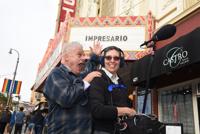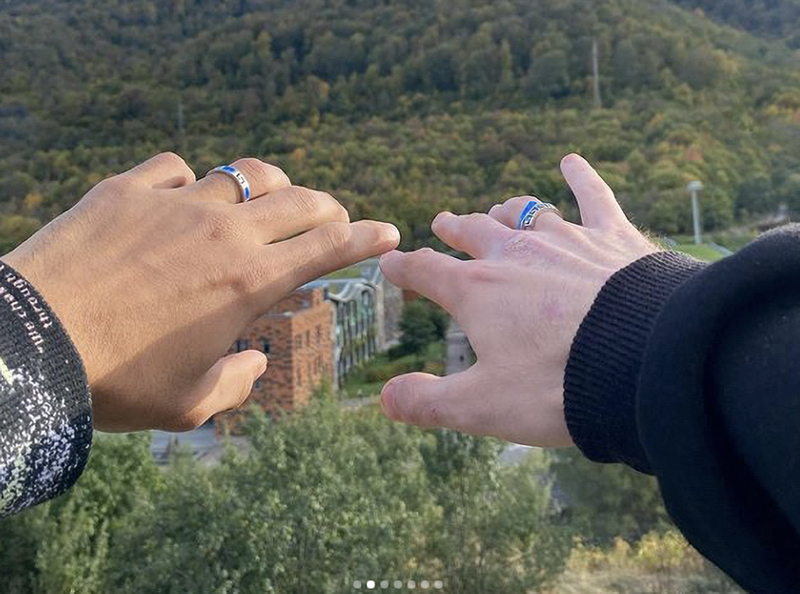Marc Huestis, co-founder the Frameline Film Festival, left, and Lauretta Molitor, director of ‘Impresario,’ the documentary about him, in front of the Castro Theatre in June 2022.
Frameline, the world’s biggest, longest-running festival of queer cinema, presents the 46th time from Thursday through June 26 with in-person screenings at a record number of Bay Area venues and a national streaming encore June 24-30. A headliner among the more than 90 films from 30 countries is the panoramic, intimate documentary “Impresario,” which is about Frameline co-founder and legendary San Francisco filmmaker and showman Marc Huestis.
Huestis, 67, tried his hand as a drag performer after arriving in The City from New York in 1974, but the accidental toss of a bottle he was holding that landed on the head of an audience member during a performance helped convince him that drag would not be a fortuitous field for him; he decided to study filmmaking at City College of San Francisco. But Huestis already had deep roots in show business, as his father was a film editor and his mother was an exotic dancer, and both, especially his mother, were huge influences on him.
“My dad worked for NBC and cut the film for ‘Hullaballoo’ that was very popular in the 1960s, and when I visited him in the editing suite at Rockefeller Center they were cutting 2-inch videotape with razor blades and magnifying glasses,” Huestis recounted. “My mom and I used to watch movies on TV together — she would be sewing her costumes and putting sequins on her pasties — and we watched a lot of the movies that I wound up doing at the Castro. She taught me the razzle-dazzle and my dad taught me the technical aspects of the business.”
Huestis used Super 8 film to make his early movies, and he took his film to Supervisor Harvey Milk’s Castro Camera shop for developing. At one point, Huestis had a spat with Milk over how the gay community should dress for Pride parades in the face of fundamentalist Anita Bryant’s wish to negatively exploit videos of the parade. Milk favored conformist suit-and-tie attire while Huestis strongly disagreed and backed an all-inclusive, come-as-you-are look.
The confrontation with Milk as well another one with “The Times of Harvey Milk” director Rob Epstein over Epstein’s disclosure to Huestis that he voted for Ralph Nader in the 2000 presidential election comes up in “Impresario.”
“I do still have that personality trait of rubbing people the wrong way sometimes; it has tempered with age, but it’s still a part of my personality,” Huestis said. “I’m glad it’s part of the movie — the good, the bad and the ugly create an interesting character. I remember vividly that fight I had with Epstein. He watched the movie, and we had a good laugh when afterward he said to me, ‘You know what, you were right.’”
Milk’s camera shop was also the scene of a notable accord, as it was there that Huestis met other up-and-coming filmmakers and proposed they form a gay film festival. That festival, which held its first screenings at a gay community center at 32 Page St., was established in 1977 as the Gay Film Festival of Super 8 Films and ultimately became known as the Frameline Film Festival.
“When we started, we were just a bunch of gay white male hippies. We all just met at Harvey’s camera store, and the films were very low-budget, none of them had synced sound, but people loved them because they saw themselves on screen,” Huestis said. “It wasn’t like there weren’t gay movies — there was ‘Boys in the Band’ — but this was the first visualization of what our life really was like and not what Hollywood or a mainstream playwright or filmmaker would interpret it to be.”
“Impresario” director Lauretta Molitor says the period when Huestis and his contemporaries were coming of age was a formative time sociopolitically and artistically for the LGBTQ+ community.
“The liberation they were building on and inventing was toward a world they wanted to live in,” Molitor said. “He’s a frontline witness and participant in the tensions, struggles and joys of that. Of course, queer people in San Francisco had been doing work on gay and lesbian rights for some time, but in some areas they were starting from scratch. The formation of the first gay film festival was just one example of that, directly out of their creative impulses.”
Huestis’ career as a filmmaker spanned 30 years and included: “Unity” (1977), about the persecution of gays in Nazi Germany; the award-winning “Sex Is” (1993), which explored gay male sexuality; and the documentary “Lulu Gets a Facelift” (2007), which followed that performer’s midlife crisis. But he is most proud of “Chuck Solomon: Coming of Age” (1986), a groundbreaking film that celebrated the theater director and drag performer prior to his death due to AIDS at a time when such tributes were captured post-mortem.
“Back then, all we would see on television were dismal portraits of people with AIDS, and that’s not to say that didn’t happen, but there was a beauty in our community where we rallied to support each other,” Huestis said. “And my film was the first depiction of how the community came together to respond to the crisis. It showed at the Berlin Film Festival and was a huge critical hit because people saw the bravery of making a film like that. Its concept discussed that we could come together to celebrate ourselves, even in the face of horrible things.”
Staging celebrity tributes at the Castro
Huestis expanded his professional pursuits in 1994 when he began staging tributes to movie stars at the Castro Theatre, starting with “The Poseidon Event-ure” that featured Carol Lynley. That successful extravaganza was followed by several other paeans to celebrities, including Ann-Margret, Jane Russell, Joan Baez, Debbie Reynolds, Patty Duke, Kim Novak, Tony Curtis, Karen Black, Sissy Spacek, Billy Wilder and many more.
Huestis points to Reynolds as his favorite guest star among the more than 25 celebrities he feted.
“Debbie Reynolds was the most fun, and I adored her,” Huestis said. “She couldn’t have been kinder to me; I didn’t even meet her or talk to her until the limo door opened, and she came out of it and acted like she was my best friend. She knew my name, she mentioned my name like three times during the show, and that was the training of old Hollywood of respecting producers and co-workers. And she was just an amazing interview.”
Huestis ranks Black, who received a thunderous reception from the audience at the Castro, as his runner-up favorite guest celebrity.
“The other one that was one of my favorites was Karen Black, because she was so nuts,” Huestis said. “I had such a good time with her, and she sang three songs, including ‘Lazy Afternoon,’ and there was a five-minute ovation in which people were stomping on the floor of the balcony and it sounded like an elephant stampede. She commented that she had never heard that sound before.”
Huestis, who has largely retired from putting on shows, cites the tribute to Black as one of many examples of the rapturous receptions that audiences gave to special guests at the Castro Theatre and which have helped make the movie house so exceptional.
“That was what was so special about the Castro — the audiences there are so embracing to these movie stars, some of whom everyone had forgotten,” Huestis said. “When I did Barbara Parkins of ‘The Valley of the Dolls,’ she came out to a huge ovation and said, ‘Who are you people, and where have you been my whole life?’”
“Impresario” will screen 4 p.m. June 21 at at the Castro Theatre with Marc Huestis and director Lauretta Molitor as special guests. (Streaming available June 24-30.)
IF YOU GO:
Frameline46
Where: Castro Theatre, Roxie Theater, SFMOMA, AMC Kabuki, Proxy in S.F. and New Parkway Theater in Oakland
When: Thursday through June 26 for in person screenings; national streaming encore for about 75% of films June 24-30
Tickets: $15.50 to $55 in theaters, $8.50 to $10.50 for streaming (streaming encore passes $105-$120)
Contact: (415) 552-5580, boxoffice@frameline.org








